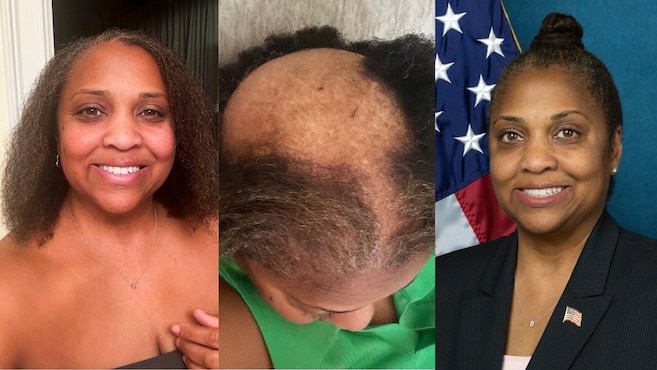Belinda Robinson has always had natural, lush hair and treated it gently, without the use of harsh chemicals.
But one day about 17 years ago, she noticed a small, smooth patch on the back of her head, and after several years of thinning hair, she was diagnosed with a form of alopecia, commonly known as alopecia.
“When I was first diagnosed, I actually cried. It was a hard thing to accept,” said Robinson, now 53 and an adjunct professor and federal government employee who lives in Northern Virginia. “Now that I know more about my illness, I know there are a lot of people out there who are going through the same thing.”
Alopecia affects millions of Americans, and while hair can sometimes regrow naturally or with treatment, Robinson had a type of permanent hair loss called central centrifugal cicatricial alopecia that primarily affects black women.
After several other dermatologists had failed to help, in 2022 a friend referred her to a Baltimore doctor who had tested for a hunch that a treatment was hiding in plain sight.
Dr. Crystal Agu, a dermatologist and director of the Ethnic Skin Program at the Johns Hopkins University School of Medicine, asked Robinson to join about a dozen black women taking the diabetes drug metformin to see if it would help slow or reverse their hair loss. Agu knew that the type of hair loss Robinson suffered from could become permanent if scarring of scalp tissue destroys hair follicles.
Similar scarring is seen in the organs of people with diabetes.
“Was anyone trying to attack the scar tissue in the scalp?” she wondered. “We needed to give women a better chance of regrowing their hair.”
Agu said hair loss has a significant impact on quality of life. Studies have shown that about 10 percent of women who need to undergo chemotherapy refuse it because of the possibility of hair loss, she said. “Devastating is an understatement,” she said.
Agu said there are two types of alopecia: non-scarring, which heals over time like chemotherapy-induced alopecia, and medications like Rogaine that can help. The most common type is alopecia areata, which actress Jada Pinkett Smith suffers from, but also about 7 million Americans, according to the National Alopecia Areata Foundation.
And Robinson has a type of alopecia that leaves scars. Central centrifugal cicatricial alopecia is the most common type and is thought to have a genetic component. According to Dr. Agu’s previous research, up to 15 percent of African-American women suffer from this type of alopecia.
She turned to “off-label,” or unapproved, use of metformin, which is used to address imperfect regulation of insulin, a hormone that manages blood sugar levels and prevents organ scarring. Agu’s previous research had suggested that insulin resistance also plays a role in scalp scarring.
Metformin is a relatively inexpensive drug that has been on the market for a long time and is considered safe for long-term use, and Agu had his patients apply a low dose of the cream directly to their scalp.
After six to eight weeks, she looked under a microscope at samples taken from the patients’ scalps to see the changes. After six months, nine people’s scalps had improved, and six had regrowth of hair. She published her findings in the September 4 issue of JAMA Dermatology.
Robinson’s hair loss stopped, and a new layer of “vellus hair” began to grow in the areas where he had been bald.
Agg says formal clinical trials, the process of testing the drug and getting it approved by the U.S. Food and Drug Administration, are now needed. This will answer questions about how much, in what form, and for how long people should take it. Research may also reveal whether the drug can treat other types of hair loss.
Typically, patients must wait for a years-long testing process, but Agg said the drug’s safety at low doses means it could be prescribed now, after blood tests to check for conditions such as kidney disease that should prevent its use.
“I’m a scientist, but I’m a human being first,” she says. “I want people to get better. It would be great if I could retire from the hair clinic and no one would have to suffer from alopecia.”
Robinson said the metformin study has given her hope, and she plans to continue taking it. She also wants to avoid wigs, wigs and other hairstyles that she feels don’t suit her. For now, she often keeps her hair tidy at work.
She’s proud to have been part of the original study and hopes it will lead to a cure — and she also wants other patients to know they’re not alone.
“This happens to people of all ages and backgrounds,” she says. “There are ways to help. My advice is to find fun ways to style your hair, try wigs, hats, scarves. There are so many ways to accessorize your scalp.”

